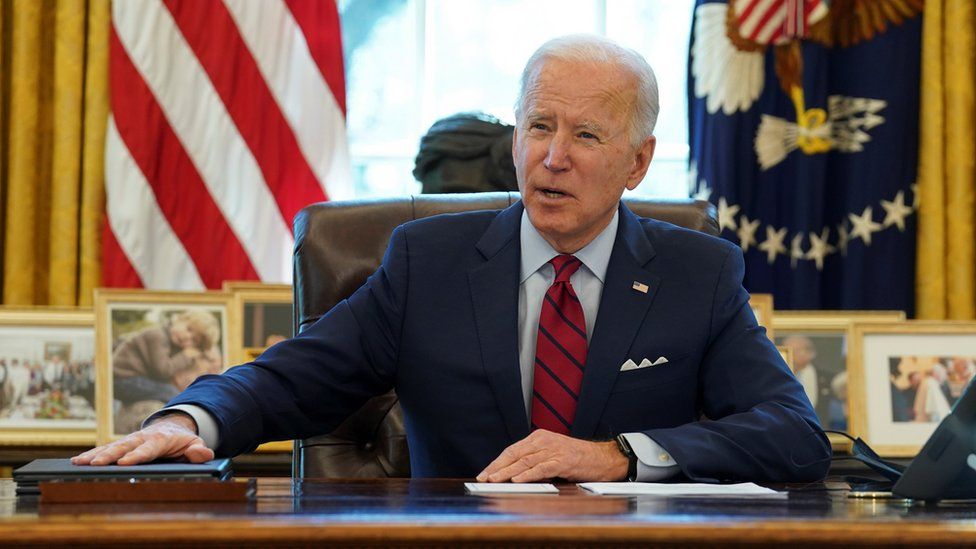US President Joe Biden has threatened to reinstate sanctions in Myanmar after the country's military seized power.
Sanctions had only recently been eased, after the country began emerging from a decades-long military dictatorship.
On Monday, Aung San Suu Kyi and other elected officials were detained, with Ms Suu Kyi's party accused of fraud over its landslide election win.
The UN, the UK and the EU have also condemned the military takeover amid fears of potential protests and unrest.
Ms Suu Kyi - who spent nearly 15 years in detention between 1989 and 2010 - has urged her supporters to "protest against the coup" in a letter written before she was detained. It warned the military's actions would put the country back under a dictatorship.
The military has refused to accept November's election results, declaring a year-long state of emergency. It has already replaced 11 ministers and deputies, including in finance, health, the interior and foreign affairs.
But in a statement, Mr Biden said "force should never seek to overrule the will of the people or attempt to erase the outcome of a credible election".
The US had removed sanctions over the past decade as Myanmar progressed to democracy. Mr Biden said this would be urgently reviewed, adding: "The United States will stand up for democracy wherever it is under attack."
However, it is unclear how much affect his words will have on Myanmar's military. Toe Zaw Latt, Myanmar bureau chief of the Democratic Voice of Burma (DVB), told the BBC that the military will know sanctions are an unavoidable consequence of their actions, adding that "they don't care about Western sanctions" and are more concerned "about how China, Japan, South Korea respond".
China, which has previously opposed international intervention in Myanmar, urged all sides in the country to "resolve differences". other countries in the region, including Cambodia, Thailand and the Philippines, have said it is an "internal matter".
Meanwhile, the UN Secretary-General António Guterres called the military's move a "serious blow to democratic reforms", as the security council prepared for an emergency meeting. The UN demanded the release of at least 45 people it believed had been detained.
In the UK, Prime Minister Boris Johnson condemned the coup and Aung San Suu Kyi's "unlawful imprisonment". European Union leaders have issued similar condemnations.
Where is Aung San Suu Kyi?
After the country's de facto political leader was detained in in the early hours of Monday morning alongside her political allies, their whereabouts were initially unclear.
Since then, unnamed sources within her party National League for Democracy (NLD) have told news agency AFP that both she and President Win Myint were both under house arrest.
"We were informed not to worry. However we are worrying. It would be a relief if we could see photos of them at home," the MP said on condition of anonymity.
The NLD has meanwhile called up on the military to accept the results of the November election where Ms Suu Kyi's party won around 80% of the votes.
Â
Despite Ms Suu Kyi's call for protests against the coup, the streets remained quiet on Monday night and Tuesday morning, with troops patrolling all major cities and a night-time curfew in force.
The communications systems which had been disrupted on Monday had returned by Tuesday morning, phone and internet connections were running again.
On the streets of the main city, Yangon, people said they felt their hard-fought battle for democracy had been lost.
Myanmar, also known as Burma, was ruled by the armed forces until 2011, when democratic reforms led by Aung San Suu Kyi ended military rule.
One 25-year-old resident, who asked not to be named, told the BBC: "Waking up to learn your world has been completely turned upside down overnight was not a new feeling, but a feeling that I thought that we had moved on from, and one that I never thought we'd be forced to feel again."
How did the coup unfold?
In the early hours of Monday, the military's television station said power had been handed over to commander-in-chief Min Aung Hlaing.
No major violence was been reported and soldiers blocked roads in the capital, Nay Pyi Taw, and the main city, Yangon.
International and domestic TV channels, including the state broadcaster, went off air. Internet and phone services were disrupted. Banks said they had been forced to close.
The military takeover follows weeks of tensions between the armed forces and the government following parliamentary elections lost by the army-backed opposition.
The opposition had demanded a re-run of the election, raising allegations of widespread fraud that were not backed by the electoral commission.
Michael Ghilezan, a partner of a US law firm who lives in Yangon, told the BBC on Monday he had expected military vehicles and protests in the city, but there was instead an eerie calm. "The most common reaction from my Burmese friends has been anger. They feel deeply betrayed by the military and the USDP."
This was reflected in other comments from the streets, although there have been some supporters of the army out waving flags in Yangon.
Theinny Oo, a development consultant, told Reuters: "We had a lawful election. People voted for the one they preferred. We have no protection under the law now."
Many people feared giving their names. One 64-year-old resident of Hlaing township told AFP: "I don't want the coup. I have seen many transitions in this country and I was looking forward to a better future."
Author and historian Thant Myint-U tweeted that a door had opened to a "very different future", and he feared for the millions who had been descending into poverty.
BBC





